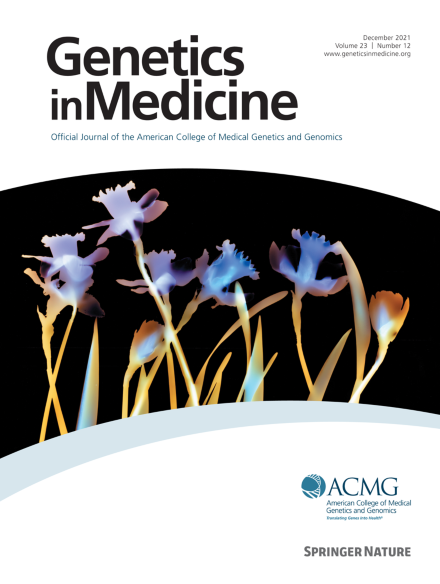Parents’ perceptions of the utility of genetic testing in the NICU
IF 6.6
1区 医学
Q1 GENETICS & HEREDITY
引用次数: 0
Abstract
Purpose
Although several studies have evaluated the perspectives of parents in the neonatal intensive care unit on the utility of genetic testing in a research context and concluded with a positive appraisal, some data point to more varied perceptions.
Methods
Semistructured interviews were conducted to elicit parental beliefs about the ways in which clinical (nonresearch) genetic testing could be both helpful and harmful.
Results
We interviewed 43 parents of 36 neonates who were recommended and either accepted or declined to participate in clinical genetic testing. Parents described 5 types of problems they believed genetic information may address, what we term problem-solving contexts: treatment, coping, parenting, prognostic, and existential contexts. Most parents consider multiple problem-solving contexts when assessing benefits, which frequently results in ambivalence.
Conclusion
Parents in the neonatal intensive care unit appear to be more ambivalent about the utility of genetic information than has been reflected in most recent studies. This discrepancy is likely related to our sample population, clinical rather than research methodology, which encouraged parents to discuss contexts beyond the medical field. Our findings suggest that informed pretest consent discussions and posttest counseling should encourage parents to discuss multiple problem-solving contexts. Researchers should also find ways to incorporate multiple contexts and diverse perspectives into their utility measures.
父母对新生儿重症监护病房基因检测效用的看法。
背景和目的:虽然有几项研究评估了新生儿重症监护病房(NICU)父母在研究背景下对基因检测效用的看法,并得出了积极的评价,但一些数据表明了更多不同的看法。方法:我们进行了半结构化访谈,以了解新生儿重症监护病房家长对临床(非研究)基因检测既有益又有害的看法。结果:我们采访了36名新生儿的43名父母,他们被推荐接受或拒绝进行临床基因检测。父母们描述了他们认为遗传信息可能解决的五种问题,我们称之为“解决问题的环境”:治疗、应对、养育、预测和存在的环境。大多数家长在评估益处时考虑了多种解决问题的环境,经常导致矛盾心理。结论:新生儿重症监护室的父母似乎对遗传信息的效用比最近的研究反映的更为矛盾。这种差异可能与我们的样本人口(临床而非研究)和我们的方法(鼓励父母讨论医学以外的背景)有关。我们的研究结果表明,知情的测试前同意讨论和测试后咨询应该让父母参与讨论多种问题解决的背景。研究人员还应该找到方法,将这些多重背景以及每种背景下的不同视角纳入效用测量。
本文章由计算机程序翻译,如有差异,请以英文原文为准。
求助全文
约1分钟内获得全文
求助全文
来源期刊

Genetics in Medicine
医学-遗传学
CiteScore
15.20
自引率
6.80%
发文量
857
审稿时长
1.3 weeks
期刊介绍:
Genetics in Medicine (GIM) is the official journal of the American College of Medical Genetics and Genomics. The journal''s mission is to enhance the knowledge, understanding, and practice of medical genetics and genomics through publications in clinical and laboratory genetics and genomics, including ethical, legal, and social issues as well as public health.
GIM encourages research that combats racism, includes diverse populations and is written by authors from diverse and underrepresented backgrounds.
 求助内容:
求助内容: 应助结果提醒方式:
应助结果提醒方式:


